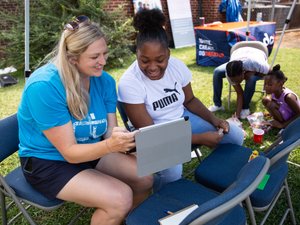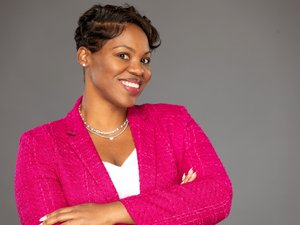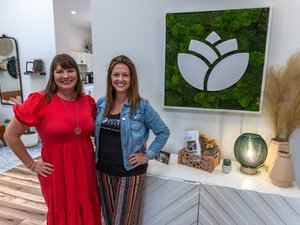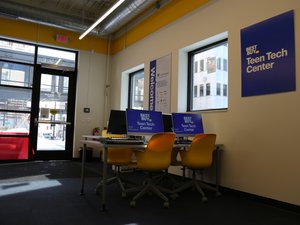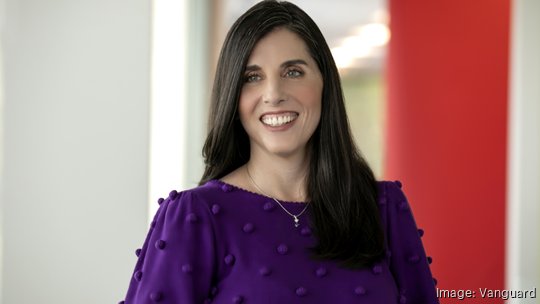
Women make up only about 28% percent of the U.S. workforce in STEM fields — those related to science, technology, engineering and math.
Leaders such as Jennifer Manry are working to change that. She has spent more than two decades in the technology industry, serving since April 2022 as head of corporate systems at Vanguard — one of the world's largest investment companies. From her seat in Charlotte, she oversees a team that builds and runs the technology for several Vanguard divisions.
Manry's tech-focused roles over the years have driven her to become an advocate for empowering women to succeed in STEM careers. She fulfills that passion through her position as board chair of Women Who Code, an international nonprofit organization with more than 340,000 members dedicated to encouraging women to excel in STEM. Manry took on that role in January but has been involved with the group for nearly a decade. She helped the nonprofit launch a Charlotte network in 2019.
Manry is also a member of Vanguard's Women's Initiative for Leadership Success, the firm's companywide effort to grow women leadership roles. Her passion to promote tech diversity led her to be a member of a divisional WILS chapter that aims to increase the representation of women in information technology leadership positions through hosting events and learning opportunities.
Manry recently spoke to the Charlotte Business Journal about her commitment to advancing women in STEM, what inspired her to join that movement and why tech diversity is essential. Following are edited excerpts:
How are those involved in the Women Who Code initiative, including yourself, working to encourage women to obtain a STEM-focused career?
It's very inspiring to see the amount of people who have joined to support this mission all around the world. I've been working with them for almost a decade. I started with them building out what they call the network. So, I started their Richmond (Virginia) network with a number of other women in the community. When I moved here to Charlotte, I helped launch the Charlotte network and have been within an advisory board capacity several times over the course of my support of them and now as the board chair. So, this is their entire mission — all about empowering women to succeed in technology careers. And what that means is it could be that they're already in a technology career, and they want to have a network to continue to grow their skills. It could mean there are brand new women entering into a technology field and they want to be surrounded by other women who maybe have done a career similar to them, and they want to have a network of support to encourage them and help them be successful. But at its heart it's really about how we provide skill development and learning opportunities so women have everything that they need. We teach, so we offer to share our expertise. We speak at events. I've spoken at a number of Women in Tech and Women Who Code events sharing career advice or answering questions about how I've taken on different responsibilities over the course of my career. And then we drive awareness to important topics. And we do research, along with a myriad of other things to encourage and support the women in the community to be successful in their roles as technologists.
What inspired you to be an advocate for empowering women to join the STEM ecosystem?
It's a very personal one. It really starts with probably the biggest inspiration in my life, which was my mom. She really was kind of a catalyst for, "You can really do anything if you set your mind and intention, and you have passion, and you work hard at things." I kind of have had this mindset going into my life and career that I wanted to be an engineer. I had a really great support system from my family, and a lot of personal commitment to learning and growing skills and continuing to grow my skills over the course of my career. Around 2012 or 2013, an important mentor of mine pulled me aside and said, "Hey, I don't know if you looked around recently, but it would be really awesome if we formalized and got really purposeful about cultivating an environment where women can grow and succeed in technology careers. And we have to continue to do this because we want to drive more representation in in technology for women." That was my personal contribution to not only when Women Who Code started, but also in my involvement with my employers. Even today at Vanguard, I wear the IT and DE&I hat. So, I'm really furthering the mission of inclusivity and women representation in my current role. I have benefited from having mentors and sponsors who encouraged me to think limitlessly about what I could be successful at doing. And so part of me felt like I needed to provide that same sort of sponsorship and advocacy; the same sort of mentoring; the same sort of role modeling for all the women around me — people who are just starting their careers as well so that they felt like they had the same encouragement access to mentoring, coaching and development that allowed them to be successful.
How important is promoting tech diversity?
At the heart of it, I feel like diversity and an environment where you can share what makes you diverse in a safe way allows teams to achieve better outcomes. And that's why I feel like it's really important to continue to support and nurture diversity in technology because at the heart of it, we want to have an environment that is inclusive and where people can share their backgrounds and perspectives to lead to great outcomes. If I reflect back on the reasons why I joined Vanguard, as well as why I feel so passionately about Women Who Code, it is because both of them feel very invested in that mission of inclusivity and creating a space where people can bring that diversity of thought and perspective and continue to grow and evolve.
From your perspective, why are women still underrepresented in STEM fields and why do we need more women in that space?
When I started getting involved in women in technology years ago, we looked at this phenomenon called the leaky pipeline. It attempts to look at the different life stages starting from early school education all the way through executive leadership and the various places where women have tried out STEM careers. And at different stages, there are different factors that play a role in either keeping women focused and engaged in a STEM-related career or things that could be could lead to attrition from that. So, as you can imagine, it's a very multifaceted issue to try to tackle. You really have to look at each life stage and the contributing factors that might lead someone to either really want to pursue a STEM-related career or things that might make them make a decision to not pursue one. And so based on the learnings from that research, and the work over several years, some of the things that I think are most important for us to be doing to help our continued progress on this is first I feel like awareness to and relatability and even accessibility to what being in a STEM career looks like when you're young is important. I think there's a lot of things that are in flight that help us address some of the various factors, starting from early education all the way through the mentoring and sponsorship that has to help, so that we keep women through the pipeline all the way through the various phases.
How have you learned to embrace the discomfort of the unknown throughout your career journey?
Everything you knew you would do carries some element of risk to it. And so I think that's the discomfort — the concern that maybe I might not be successful at this thing. As I have reflected back on why I've been OK with that discomfort IT is because I kind of remember that early advice I got when I was a child — if I'm really passionate and committed to something and I'm willing to work hard for it, then I can determine my own success. I look at these areas of discomfort now where I'm feeling like I'm taking a risk and think to myself, "You're actually going to grow. There's something you're missing right now that is a growth opportunity that's making you feel nervous about this, but you can actually learn this." I think that discomfort I've now turned into excitement because excitement means that I'm going to learn something new. This discomfort means I'm going to experience growth in this new endeavor that I'm taking on and that on the other side of it, I'll have a new skill or a new capability or new competency that I didn't have before I undertook this.
What advice do you have to women who are experiencing doubt about starting a career in the STEM field?
I would say something that's benefited me in those times is having my own advisory board or great mentors that I can go to and voice not only my fears about taking on a risk, but also why I think it's a good opportunity. So, just having a great sounding board or some people call it their personal board of directors. But just having a solid set of people who you can go to for great counsel and advice on things. I think the other things is be willing to go out there and learn yourself. I think every time I take on a new job, there's something I have to learn. And so it's a personal investment and commitment of my own time to want to upskill myself or rescale myself and whatever it is that it's going to require me to be successful in the in the new thing that I'm doing.

